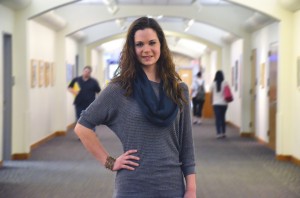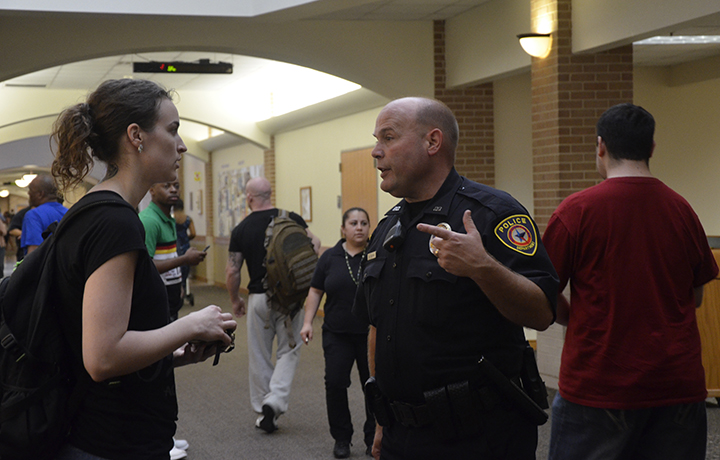By Kenney Kost/managing editor
For most, walking onto a college campus for the first time is an exciting but somewhat familiar experience. Walking to class, grabbing lunch and hitting the library for a little study time between classes are all familiar to youth from junior high and high school.
But what about a growing group of young people who get up and simply walk to their den in their pajamas after breakfast, grab a textbook and listen to mom or dad begin to lecture about the American Revolution? What about home-schoolers?
Currently, TCC does not differentiate between home-schooled and traditional students upon registration. There is no way to compare Accuplacer scores or GPA between the two at this time.
TCC does keep track of how many dual-credit students attend classes. In fall 2012, 183 home-schooled students registered as dual-credit across the district. NE director of academic affairs Jack Dalrymple said most of the dual-credit students are brought to TCC through partnerships with several school districts across the area, but they don’t reach out specifically to home-schoolers or home-school associations.

“The vast majority of what we do is through partnerships with four school districts in the area,” Dalrymple said. “We get a few that come in the summer, mostly through word of mouth and through associations with knowledge of our program, and we point those families in the right direction.”
People tend to buy into a stereotype that home-schooled children are socially awkward and may not be ready for the college experience. The truth is several home-school associations and groups such as PEACE in Arlington, offer a variety of social services like a day at the park with other kids and even home-school proms. So there is a social structure in place for the children to grow in.
SE student Raelea Hiller is a dual-credit student finishing her senior year in high school while taking core classes on SE Campus. She is the third child of four who were and are being home-schooled. She is currently in her second semester as a dual-credit student.
On Tuesdays and Thursdays, she heads to SE Campus to attend her Introduction to Computing and English 1302 classes. She said the transition to college was seamless.
“I did have outside classes, so it’s not like I was shut in the house all day with no friends,” she laughed. “The work I did at home prepared me for the curriculum here at TCC. I did well on the Accuplacer, and I am doing well in my classes.”
Hiller found out about the dual-credit program from her parents. Her sister, Bethany Hiller, who works in the math lab on SE Campus, was home-schooled and went through the program at TCC.
“My sister did it and did very well in her transition, so I had guidance,” Raelea Hiller said. “I see a dual-credit counselor from time to time who is helpful, but most of it, I do on my own.”
Brothers Caleb and Nathan Johnson attend NE Campus. Nathan Johnson graduated from high school and is in his second semester as a full-time student. Caleb Johnson is currently a junior in high school and in his second semester as a dual-credit student.
“The main difference for me was that I had to drive to school,” Nathan Johnson said. “It was a little different parking, grabbing my backpack and walking across a campus to get to class. I am used to getting up and starting class with breakfast at the kitchen table. As far as the social aspect, I think every new student coming to college is going to be a little nervous, and I was no different.”
Both agree that the advanced curriculum their parents chose for them prepared them for college work.
“I think it was actually easier for me [transitioning to college],” Nathan Johnson said. “The college curriculum is actually very similar to the curriculum I was taught in home-school. Also, my mom would make extra lessons on her own that she felt would be beneficial to us.”
Home-schooling parents have several options on the type of curriculum to teach. Just as in a normal high school or private school setting where there are general studies, advanced studies and advanced with honors programs, home-school curriculum has the same options, Caleb Johnson said.
“From what I’ve seen, public school curriculum is a bit easier,” Caleb Johnson said. “But there are different levels of home-school. We just did an advanced curriculum. Parents can choose more advanced or general.”
Both Johnsons agree that college classes, to this point, have been easier and the transition was not hard at all. They believe their teachings at home have given them a leg up.
Another advantage home-schoolers have, Nathan Johnson said, is they can set their own pace and get ahead in schoolwork.
“We can work through the curriculum however we like,” Nathan Johnson said. “My brother, for example, is completely finished with his chemistry work for the year. He can now devote more of his time to geometry and his college courses.”
Caleb said this is helpful as he needs all the time he can to prepare for college-level math. Being able to set his own pace allows for more time to focus on tougher subjects.
“It encourages me to do my work and not to slack,” Caleb Johnson said. “Knowing that I will be able to put more time into something if I just get the easier stuff out of the way is a good feeling.”
They all agree home-schoolers are no different than any other college student. As long as the student works and studies, the same education can be attained whether it’s public, private or home-schooled. The transition can be seamless or stressful for anyone.
“We have an advantage, I believe, because the work we did at home was pretty much college level,” Caleb Johnson said. “I’d say college work is a good deal easier. At home-school, I make B’s and C’s. In college, I’m a 4.0 student.”

























